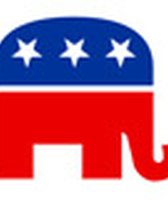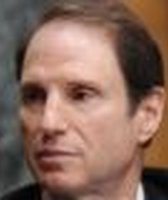Stand up for the facts!
Our only agenda is to publish the truth so you can be an informed participant in democracy.
We need your help.
I would like to contribute
Spending bill wasn't candidate Obama's "type," Boehner points out
Speaking on the House floor, Republican Leader John Boehner railed against a spending bill with some 9,000 earmarks, calling on President Obama to veto it and insist on one free of pet projects.
"The president campaigned against this type of legislation, this number of earmarks," the Ohio Republican said on Feb. 25, "and I would hope that the president would veto this bill because Republicans in Congress will be here to uphold his veto of this piece of legislation."
Several news organizations made even harsher claims. The New York Times , for example, reported that Obama would sign the bill, earmarks and all, "despite campaign promises to put an end to the practice."
That's incorrect. Obama did not promise to end earmarking, only to "reform" it, and eliminate "screwy" or wasteful earmarks.
Boehner, however, was more careful than the New York Times. His claim that Obama "campaigned against this type of legislation" could be read a number of ways.
Boehner's spokesman, Michael Steel, said Boehner meant that Obama had broken his campaign pledges, referenced on the White House Web site , to "slash earmarks to no greater than 1994 levels and ensure all spending decisions are open to the public." That's a reasonable interpretation of what Boehner said.
Obama did indeed make those pledges during the campaign. Sen. John McCain, the Republican candidate, pledged to eliminate earmarks and "veto every earmark pork-barrel bill," and Obama, though stopping short of that, did pledge to get tough on them.
For example, here's Obama in the first presidential debate : "Absolutely, we need earmark reform. And when I'm president, I will go line by line to make sure that we are not spending money unwisely."
On March 10, 2008, Obama said in a statement : "We can no longer accept a process that doles out earmarks based on a member of Congress' seniority, rather than the merit of the project. We can no longer accept an earmarks process that has become so complicated to navigate that a municipality or nonprofit group has to hire high-priced D.C. lobbyists to do it. And we can no longer accept an earmarks process in which many of the projects being funded fail to address the real needs of our country."
And here he is on Feb. 21, 2008 : "I have been consistently in favor of more disclosure around earmarks. Now, keep in mind a lot of these are worthy projects in our states, and I have actively pursued projects that I think are important. But I want to make sure that they're not done in the dark of night, that they're not done in committee, that everybody stands up and says this is the kind of spending that I think is important."
The closest he came to saying he would eliminate earmarks, as far as we could find, was when he said, in the third presidential debate , "Earmarks account for 0.5 percent of the total federal budget. There's no doubt that the system needs reform and there are a lot of screwy things that we end up spending money on, and they need to be eliminated. But it's not going to solve the problem." (Given his other campaign statements on earmarks, it's clear he meant "screwy," or wasteful, earmarks should be eliminated, not all earmarks.)
So the question is, is the omnibus spending bill the "type of legislation" that Obama campaigned against with respect to earmarks? That is, did it lack transparency, include earmarks based on a congressman's seniority and ones that are wasteful? And was the amount more than the 1994 level of $7.8 billion a year?
The answer to most of those questions is largely yes, said Keith Ashdown, investigator for Taxpayers for Common Sense, a Washington watchdog group. Ashdown said the earmarking process for the omnibus bill was not any more transparent than it was when Obama was campaigning. He said seven of the top 10 earmark recipients in the Senate are on the Appropriations Committee, suggesting that access was more important than merit when it came to deciding what projects would get earmarks.
And though the total cost of the earmarks in the bill, $7.7 billion, is slightly less than the 1994 level, there were another $6.6 billion in earmarks in three previous spending bills for this year that Congress passed last year.
Are there wasteful projects in the bill? Ashdown said he hasn't had time to research that. "There likely is, but I just don't know," he said. He cautioned against leaping to conclusions about projects that "sound goofy." For example, some critics have mocked a $1 million earmark to control Mormon crickets in Utah — but Ashdown said the Mormon cricket, a type of katydid, is a very serious threat to agriculture.
The White House has argued that Obama should not be held responsible for the earmarking process in this legislative package — which is nine of the 12 spending bills for the current budget year rolled into one — because it is "last year's business."
And there's some truth to that. These are bills that Congress was supposed to pass last year.
But that doesn't nullify Boehner's point that the bill is — in featuring earmarks added by senior members of Congress in a process that lacked transparency and pushed earmark spending for the year well over $7.8 billion — the "type of legislation" Obama campaigned against. We find Boehner's claim to be True.
Our Sources
States News Service, Rep. Boehner Urges President Obama to Veto Democrats' Wasteful, Secretive $410 billion 'Omnibus' Spending Bill, Feb. 25, 2009
Project VoteSmart, Remarks of Senator Barack Obama: An Agenda for Middle-Class Success , July 7, 2008, accessed March 2, 2009
Project VoteSmart, The First Presidential Debate - Transcript , Sept. 26, 2008, accessed March 2, 2009
Project VoteSmart, Obama Cosponsors One-Year Moratorium on All Congressional Earmarks , March 10, 2008, accessed March 2, 2009
Project VoteSmart, Democratic Presidential Candidates Debate , Feb. 21, 2008, accessed March 2, 2009
Project VoteSmart, The Third Presidential Debate - Transcript , Oct. 15, 2008, accessed March 2, 2009
PolitiFact.com, Barack Obama Campaign Promise No. 431 : Reduce earmarks to 1994 levels, accessed March 2, 2009
PolitiFact.com, Barack Obama Campaign Promise No. 235: Require more disclosure and a waiting period for earmarks , accessed March 2, 2009
Associated Press, Budget Chief, Obama Will Sign Spending Bill , March 1, 2009, accessed March 2, 2009
New York Times, White House Defends Approval of Pet Projects , March 1, 2009, accessed March 2, 2009
Scripps Howard News Service, Editorial: Just This Once, March 2, 2009, accessed March 2, 2009
Interview with Keith Ashdown, chief investigator, Taxpayers for Common Sense, March 2, 2009
Interview with Michael Steel, spokesman for Rep. John Boehner, March 2, 2009
Browse the Truth-O-Meter
More by Alexander Lane
Spending bill wasn't candidate Obama's "type," Boehner points out
Support independent fact-checking.
Become a member!
In a world of wild talk and fake news, help us stand up for the facts.























































